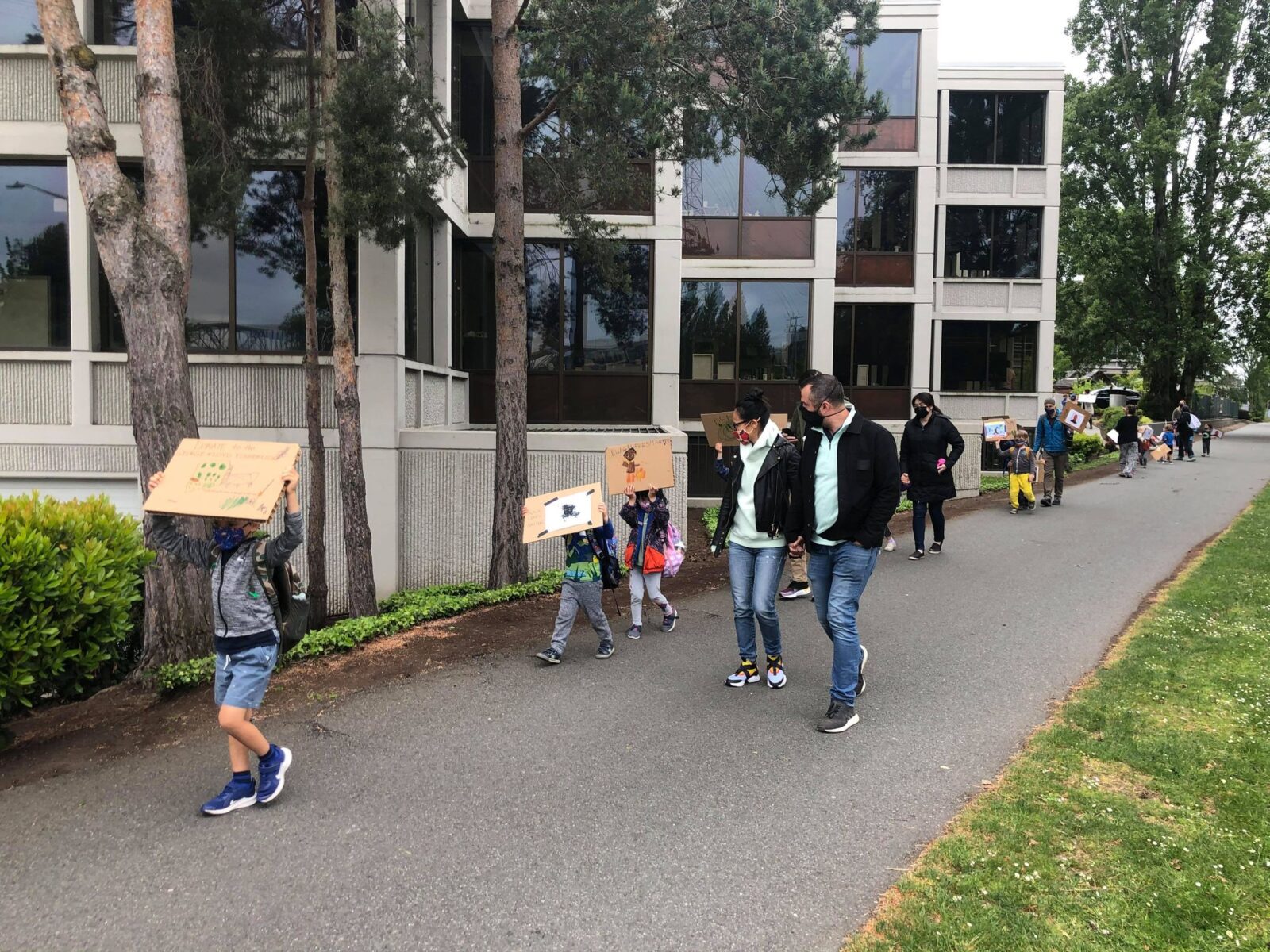Social Justice and Equity

Faculty, families, volunteers, visitors, and contractors are expected to critically think, professionally reflect, and integrate social justice interactions within our learning community. All must stay alert to cultural awareness and equity in a compassionate, empathetic, and impartial manner. We acknowledge that this work is ongoing, and all adults who enter our community will present various knowledge and comfort levels in their cultural competency. We promise to support everyone where they are in their social justice commitment and to remain as open-minded as we can along the way.
Individuals having challenges consistently applying anti-bias, anti-racist, culturally responsive approaches in their commitment will receive resources needed to ensure appropriate engagement within the community. We will provide ongoing opportunities for individual and group conversations to enhance our overall organizational growth in social justice. Our classrooms include multicultural education materials, our faculty participate in ongoing professional development focused on equity, and our community outreach program offers trainings with a social justice lens through our educator and family discussion series.
Culturally Responsive Approach
Our goal with families is to meet them where they are and strengthen our relationships to ensure greater success for children. We acknowledge the fears and anxieties that come with trusting others with your child and bringing us into your family, and we strive to support one another while leaning into the discomfort together. This work is what it means to be a learning community, and we must tend to our relationships as we heal with one another through love, open heart and empathy.
Anti-Bias and Anti-Racist Education
Anti-bias and anti-racist education are woven and embedded into every part of our curriculum and our lived experiences with children. As educators, we are setting the stage and creating a safe environment for children to engage in meaningful conversations with each other and the people in their lives. We ask educators and families to be vulnerable, lean into discomfort, and learn imperfectly together, to create a space for children to do the same. We want to ensure that children feel comfortable and safe to have critical conversations that support those who may have different experiences than their own. Our faculty strive to model and foster the four goals of anti-bias and anti-racist education:
Identity: Nurture the development of a positive identity in each child.
Diversity: Promote each child’s ability to interact with people who are different from him/herself.
Justice: Foster each child’s critical thinking about bias.
Action: Cultivate each child’s ability to stand up for her/himself and for others in the face of bias.
Young children are constantly building theories about the world around them. Research shows that children start developing biases as early as six months old and solidify their biases and ideas about the world around them as early as age seven. This research proves the importance of doing this work with children because they will construct and solidify their ideas about the world whether we choose to engage in conversation with them or not. Knowing this, we carefully listen to children’s conversations and observe their interactions and play, which reflects the theories they are constructing.
As educators, we reflect on how to respond to these conversations in the moment, and develop intentional, thought-out plans to dive deeper with children in developmentally appropriate ways. We intentionally make space for deep, yet meaningful thinking and conversations around identity and race. We encourage sharing different perspectives and respectful conversation. We also pay attention to what children might not be talking about, so that we can share new perspectives from our community, while also giving them accurate information about the world around them.
Social Justice Education
Social justice education is at the heart of our teaching practices. Educators call attention to the ways in which people are different and the ways in which people are the same, honoring individual and group identity. They intentionally introduce issues of fairness and unfairness, and coach children to think critically and to act when needed. Educators learn about children’s family and cultural identities and integrate those identities into the daily life of the classroom, at the same time as they acknowledge the ways in which their own cultural identities shape their teaching.
Multiculturalism Education
Multiculturalism is vital for all children because it sets social goals and promotes respect for all people and the environment we inhabit. We utilize books, music, games, and a wide range of activities as aids to teach our children respect for our world and the diversity of life upon it.
We support multilingual children and families, inviting those families to teach words from their home language to educators and classmates. For English Language Learners (ELL) and Dual Language Learners (DLL), we offer support in the context of social play and classroom activities that encourage them to maintain their first language while learning English.
Multicultural Education is…
- Basic diversity education – involves teaching children about diversity within and between cultural groups
- Education for social justice – teaches about equality and equity between cultures, genders, and races
- Important for all children because it teaches children to preserve, respect, and value their own and each other’s beliefs, cultures, languages, perspectives, traditions, and ways of being
- Every day and everywhere – omnipresent
- A never-ending process that emphasizes reflective practice-critical self-awareness
- Critical pedagogy – scrutinizing learning materials to identify potentially prejudicial or biased content, analyzing cultural assumptions, and discussing how learning content, teaching practices, and program policies reflect cultural bias, and how they are changed to eradicate disparities
- Supporting Antiracist and Resistant Education
- About teaching children that knowledge and race are socially constructed and reflects researchers’ personal experiences as well as economic, political, and social contexts in which they live and work
- Being inclusive – incorporating beliefs, histories, perspectives, texts, and values of people from ethnically diverse cultural backgrounds and making curriculum and teaching practices accessible to students in all cultural groups
- About reforming processes and involves undoing cultural, individual, institutional, structural, and systemic racisms